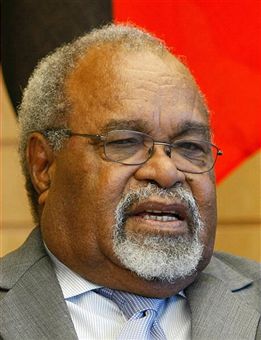CONSTITUTION BREACHED BY SOMARE AND MOBS
JOHN NONGORR
Sir Michael Somares Government has again broken PNGs Constitution for temporary gain - to retain political power. The events that unfolded on the floor of the Parliament on July 21 were not only contrary to the Constitution but also a disgrace to parliamentary democracy.
The fact that the Constitution was broken is clear. Sir Michael Somare, as Prime Minister, is responsible for Minister Paul Tiensten and Speaker Jeffrey Nape colluding to break Section 124 of the Constitution as interpreted by the Supreme Court in 1999 and 2000.
Section 124(1) says that the Parliament must sit for nine weeks in each year. In 1999 and 2000, the Supreme Court ruled that nine weeks means 63 days. In the year from August 6, 2009 to August 7, 2010, the Parliament would have sat for only 35 days. There is a shortfall of 28 days.
The reason why Sir Michael Somare, in concert with Mr Tiensten and Mr Nape, broke the Constitution, was for short-term personal political power gain. As such, it is not in the interest of the country. The three cannot claim to act in the interest of the country if they are breaking the laws of the country, the very laws that give them status and political power.
Breach of Constitution, Section 124(1)
Section 124(1) of the Constitution says that The Parliament shall be called to meet ... in principle, for not less than nine weeks in each 12 month period.
In the two Supreme Court decisions - first, SCR No.3 of 1999 - Special Reference by the Ombudsman Commission (1999) SC628; and second, SCR No.3 of 2000 - Special Reference by the Governor-General re Sitting Days (2002) SC722 - the Supreme Court ruled that the nine-week requirement means that Parliament must sit for 63 days in each 12 month period. (This 12 month period is computed from the date writs are returned after a general election. Most writs following the 2007 general election were returned on August 6, 2007. Therefore, the 12 month period is from 06 August one year to August 7, the next year.)
On July 21, Parliament adjourned to November 16. As noted earlier, in the 12-month period between August 6, 2009 and August 7, 2010, the Parliament sat for 35 days. Because it will not sit until after August 7, 2010, there will be no opportunity for any more sittings. Therefore, the 35 days that Parliament has sat falls far short of the 63 days decided by the Supreme Court, and this is a breach of Section 124(1) of the Constitution.
In the preceding 12 month period from August 6, 2008 to August 7, 2009, the Parliament sat for only 33 days. This was short by 30 days.
Supreme Court decisions are binding and are law.
The Supreme Court interpreted Section 124(1) in the two named cases in a special procedure under Section 19 of the Constitution called Special References. Once the Supreme Court interprets the law, the Courts interpretation or opinion is binding. Section 19(2) of the Constitution makes this clear, by stating - An opinion given ... has the same binding effect as any other decision of the Supreme Court. When the Supreme Court pronounces what the law is on a particular matter, that is the law.
A later Supreme Court or the Parliament may change the law as pronounced by the Supreme Court. Until that happens, the law as pronounced by the Supreme Court must be followed by everyone.
To disregard the law as pronounced by the Supreme Court is a breach of the law. It is also disrespectful of the Supreme Court and the judiciary, the third arm of government.
Why is it that the Parliament is allowed to continue to breach Section 124(1) of the Constitution?
It is because lawyers advising the Government and individual politicians who want to retain political power to themselves are influenced by only one thing - they want to retain political power and they approach important legal requirements with that as their only objective, and their interpretation of the law is twisted to suit this objective. In other words, they do not care about the bad consequences that arise from it.
As to who is the prime minister, speaker or minister exercising political power in 2, 3, 4 or 5 years is a short--term thing. In its basic form, it is another job to be prime minister, minister or speaker.
But, establishing strong principles of law and ethics on which the country will be governed in the long-run, cultivating a sense of fairness in politics and in the important rules that govern the Parliament for example, are critical to building a strong nation. Such principles observed and upheld should serve as beacons for all PNGans to follow.
Instead, PNG has and continues to witness politicians (and their yes-man lawyers) twisting laws to suit short-term political power gain and preach that somehow this is good for PNG. It should not matter who is prime minister, minister or speaker. What should matter is that, whoever they are, they follow the law and show some sense of fairness.
The constitutional obligation on Parliament to sit for 63 days in each 12 months period
In the first Supreme Court decision - SCR No.3 of 1999 - Special Reference by the Ombudsman Commission (1999) SC628 - a reference filed by the Ombudsman Commission, the Supreme Court ruled that the nine week requirement means that the Parliament must sit for 63 days in each 12 month period. This court was made up by seven judges. Six of the seven judges said that nine weeks means 63 days. Then Chief Justice, Sir Arnold Amet, disagreed. The majority of six judges set the law.
Apart from stating the law that Parliament must sit for 63 days in each 12 month period, the Supreme Court also ruled that:
1. the 63 days sitting requirement was mandatory, meaning that the Parliament must aim to sit for 63 days; and
2. the National Court had power to impose imprisonment and fines on MPs under Section 22 and 23 of the Constitution.
In the second Supreme Court decision - SCR No.3 of 2000 - Special Reference by the Governor-General re Sitting Days (2002) SC722, also seven judges were involved. This was a reference filed by the National Executive Council. Its main objective was to get the Supreme Court to overturn the first decision. I was one of the lawyers who asked the Supreme Court to overturn the first decision.
In particular, in this second case, the Supreme Court was asked to rule that:
1. Parliament did not have to sit for 63 days but could sit for nine weeks meaning the normal parliamentary week which consists of sittings on four days a week, making 45 sitting days;
2. this requirement was not mandatory; and
3. that action cannot be taken against MPs under Sections 22 and 23 of the Constitution.
Again, then Chief Justice Sir Arnold Amet (and on some issues, Justice Don Sawong) were in the minority. The majority of five judges ruled again that Parliament must sit for 63 days, and affirmed that action can be brought in the National Court against MPs breaching this requirement under Sections 22 and 23 of the Constitution.
Therefore, the second decision reaffirmed the law as stated in the first decision - that Parliament must sit for 63 days in each 12 month period. If this is not observed, proceedings can be brought in the National Court against MPs who are responsible for breaking the requirement.
The one thing that the Supreme Court was very clear on is that adjourning the Parliament for a long period, to avoid a no confidence vote, is not a good reason for Parliament to not sit for the required 63 days.
Until another Supreme Court or the Parliament changes this law on Section 124(1) of the Constitution, the Parliament must sit for 63 days in each 12 month period. Sitting for less than 63 days, especially if done in order to avoid a no confidence vote, is in breach of Section 124(1).
Adjournment in July 2010 sitting of Parliament
In the last July sitting, it is clear that the reason why Parliament was adjourned until November 16 is to frustrate a no confidence vote. That is the only reason why Sir Michael, in collusion with Mr Tiensten and Mr Nape, not only broke Section 124(1) of the Constitution but they breached the Standing Orders of the Parliament towards the same aim.









Comments
Post a Comment
Please free to leave comments.